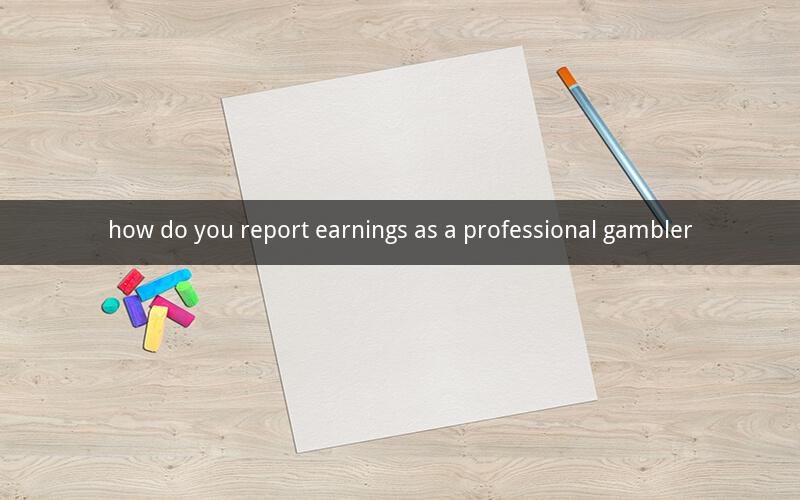
Table of Contents
1. Understanding Earnings Reporting for Professional Gamblers
2. Types of Earnings in Gambling
3. Record Keeping for Earnings
4. Tax Implications for Professional Gamblers
5. Reporting Earnings to the IRS
6. Keeping Receipts and Documentation
7. Calculating Taxable Income
8. Filing Taxes as a Professional Gambler
9. Common Challenges in Reporting Earnings
10. Resources and Support for Professional Gamblers
1. Understanding Earnings Reporting for Professional Gamblers
Professional gamblers must understand the importance of reporting their earnings accurately and on time. This ensures compliance with tax laws and avoids potential penalties and interest. Reporting earnings involves keeping detailed records, understanding tax implications, and following proper procedures for filing taxes.
2. Types of Earnings in Gambling
Professional gamblers can earn money through various sources, including:
- Winning bets at casinos, racetracks, or sportsbooks
- Winnings from poker, blackjack, or other card games
- Winnings from online gambling platforms
- Prizes won in gambling-related contests or tournaments
3. Record Keeping for Earnings
Proper record-keeping is crucial for reporting earnings accurately. Gamblers should keep detailed records of all gambling-related income, including:
- Dates and locations of gambling activities
- Amounts won or lost
- Documentation of winnings, such as casino win statements or poker tournament payouts
- Receipts for any gambling-related expenses
4. Tax Implications for Professional Gamblers
Professional gamblers must be aware of the tax implications of their earnings. While gambling winnings are generally taxable, losses can be deducted, subject to certain limitations. It's important to understand the differences between gambling as a hobby and gambling as a business, as this can affect how earnings are reported.
5. Reporting Earnings to the IRS
Professional gamblers must report their gambling earnings on their tax returns. This is typically done using Schedule C (Form 1040) for self-employment income. Here are the key steps for reporting earnings:
- Report all gambling winnings on Schedule C
- Deduct any gambling-related expenses on Schedule C
- Calculate net income from gambling activities
- Pay taxes on the net income
6. Keeping Receipts and Documentation
Keeping receipts and documentation is essential for substantiating deductions and supporting your tax return. Here are some types of documentation to keep:
- Casino win statements
- Poker tournament payouts
- Receipts for gambling-related expenses, such as travel, meals, and equipment
- Records of any gambling losses
7. Calculating Taxable Income
To calculate taxable income from gambling, follow these steps:
1. Add up all gambling winnings
2. Deduct any gambling-related expenses (up to the amount of gambling winnings)
3. Subtract any gambling losses from the total gambling expenses
4. Report the net income from gambling on Schedule C
8. Filing Taxes as a Professional Gambler
Professional gamblers must file their taxes using the appropriate forms. Here's a general outline of the process:
1. Gather all necessary documents, including tax returns, receipts, and documentation
2. Fill out Schedule C (Form 1040) to report gambling income and expenses
3. Submit the completed tax return, along with any supporting documents, to the IRS
4. Pay any taxes owed, either through estimated tax payments or when filing the return
9. Common Challenges in Reporting Earnings
Reporting earnings as a professional gambler can be challenging due to:
- The fluctuating nature of gambling income
- The complexity of tax laws and regulations
- The need to keep detailed records and substantiate deductions
10. Resources and Support for Professional Gamblers
Professional gamblers can seek assistance with tax reporting and planning from:
- Tax professionals, such as Certified Public Accountants (CPAs) or Enrolled Agents (EAs)
- Tax software designed for professional gamblers
- Gambling industry associations and organizations
Questions and Answers
1. Q: Are all gambling winnings taxable?
A: Yes, all gambling winnings are taxable, except for certain prizes or sweepstakes winnings that are not reported on a W-2G form.
2. Q: Can I deduct gambling losses?
A: Yes, you can deduct gambling losses up to the amount of your gambling winnings. However, you must have documentation to support these losses.
3. Q: Do I need to report gambling winnings from online platforms?
A: Yes, you must report all gambling winnings, regardless of the source. Online gambling winnings are subject to the same tax rules as winnings from traditional gambling venues.
4. Q: Can I deduct travel expenses for gambling?
A: Yes, you can deduct travel expenses for gambling if they are directly related to your gambling activities. However, you must have receipts and documentation to support these deductions.
5. Q: Can I deduct the cost of a gambling license or membership?
A: Yes, you can deduct the cost of a gambling license or membership if it is directly related to your gambling activities.
6. Q: How do I report gambling income if I have multiple sources?
A: Report all gambling income on Schedule C (Form 1040) and include all relevant expenses. Be sure to keep detailed records of each source of income.
7. Q: Can I deduct losses from a hobby that I also use for gambling?
A: No, you can only deduct gambling losses if you report gambling as a business on Schedule C (Form 1040). If you consider gambling a hobby, you cannot deduct losses.
8. Q: What if I have a dispute with the IRS over my gambling income?
A: If you have a dispute with the IRS, you can request a conference with a tax examiner or file an appeal with the IRS Appeals Office.
9. Q: Can I deduct the cost of a gambling-related website or software?
A: Yes, you can deduct the cost of a gambling-related website or software if it is directly related to your gambling activities.
10. Q: How can I find a tax professional to help me with my gambling income?
A: You can find a tax professional by searching online, asking for referrals from friends or colleagues, or contacting a local tax preparation firm. Be sure to choose a professional with experience in gambling tax issues.